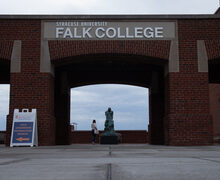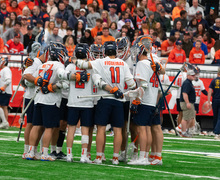Shared group identity doesn’t translate to shared ideology
In light of the 2006 midterm election, it became clear that the ‘big tent’ over the Democratic Party got a lot bigger as socially conservative candidates ran on the blue ticket. With cleavages over same-sex marriage and abortion still splitting the party, I have identified situations in my own life that resemble the situation.Like the Democrats, the communities and groups with which I chose to identify myself sometimes contain people whose beliefs differ from my own. And when issues are particularly complicated or when a divisive issue becomes confined to two sides. I find myself reluctant to pick sides. For example, when asked how I feel about the Israel-Palestine conflict, I find myself in a conundrum. On one hand, I am Jewish and believe strongly that my people need a safe place to exist, especially in light of the Holocaust. But on the other hand, I cannot deny that through my education I have come to sympathize with the Palestinians to an extent. As a reform Jew I know believing in Israel’s legitimacy is not a requisite tenet of faith, but as Israel’s existence is tied to Jewish identity, I can’t help but feel like I am in the margins of my own religion.Another big, ideology-charged part of my life is this newspaper. For three semesters I was an editor and had to take responsibility for judgments and decisions that not only influenced our coverage, but also our staff and readers. I won’t say that I was right all the time, or even in the majority, but I realized that sharing a desire to produce the best paper possible did not mean that we all agreed on what producing ‘the best paper we could’ meant.Talking with friends, peers and family leads me to believe that this phenomenon is not exclusive to me. A floormate of mine freshman year had by far the strongest interest in national politics I have ever seen. Dave Vassallo, a junior electrical engineering and political science major will talk politics with anyone who will listen. Curiously, people who also have a keen interest in politics assume that he identifies with a political party.’I lean more left than right, but I tend to be in the middle,’ Vassallo said. He enjoys it, however, when people assume he has a political affiliation. ‘Ironically, (people of both parties) usually assume me to be of the opposite party,’ Vassallo said. It makes him happy, ‘because a good moderate is always assumed to be of the other party.’Too often values and ideologies associated with groups form binaries that leave no room for the third way. On Israel, I am not absolutely pro-Israel, but nor am I an anti-Israel. The issue is too complex to be expressed in blacks and whites, I only wish there was a term for my third way.It is important to remember then, that sharing an identity does not necessarily mean sharing a belief.
Ben Peskin is a featured columnist whose columns run weekly in The Daily Orange. E-mail him at [email protected].
Published on January 24, 2007 at 12:00 pm




